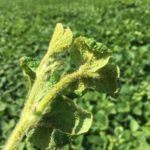Reading Time: 2 minutes Damaged patches of soybeans around Manitoba this year could be due to a combination of stresses, says Manitoba Agriculture plant pathologist Holly Derksen. “It’s a tricky year for diagnosing these problems,” Derksen said Wednesday during the Crop Talk Westman webinar. “When multiple stressors are present often the soybean plants may respond differently. Not all plants, […] Read more

Stressors pile up for Manitoba soybeans

New record set for Prairie grain throughput in 2016-17
Reading Time: 4 minutes Western Canada’s grain industry moved a record volume of grain in the 2016-17 crop year that ended July 31 and is gearing up to ship this year’s crop, expected to be the smallest in four years. Export terminals at Vancouver, Prince Rupert and Thunder Bay put through 35.945 million tonnes of grain last crop year, […] Read more

Some soybean aphids showing up so scout your fields
Reading Time: 2 minutes Soybean aphids are being found in some soybean fields near Portage la Prairie and some fields have been sprayed, while others are being monitored, Red Beard Farms aerial applicator Chris McCallister said in an interview July 27. The threshold for applying an insecticide to control soybean aphids is 250 and rising. The “rising” part is […] Read more

U.S. state-level dicamba bans temporary
Reading Time: 2 minutes A ban on dicamba applications in Missouri could end by the weekend, a state agriculture official said Monday. “The intent was never for this to be a long pause,” Missouri Agriculture Director Chris Chinn told the U.S. farm show Agritalk on Monday, after Missouri became the second state to announce such a ban so far […] Read more

Xtend soybeans expand options, but be dicamba-drift aware
Reading Time: 4 minutes New dicamba- and glyphosate-tolerant soybeans offer more weed control options and are another tool to address herbicide-tolerant weeds, but farmers need to take steps to avoid dicamba drift and spray tank residue, Manitoba officials say. What’s been happening in Arkansas underscores the risk dicamba drift presents. The U.S. state of Arkansas on Friday announced a […] Read more
Consultations sought on grading U.S. wheat imports
Reading Time: 3 minutes Grain industry consultations are needed before the Canada Grain Act is amended to allow imported U.S. wheat to receive a Canadian Grain Commission (CGC) grade, the Saskatchewan Wheat Development Commssion says. “(W)e need to have public consultations to figure out the consequences of adding more American grain to our system,” Sask Wheat chair Bill Gehl […] Read more

Early reviews positive for grain transportation bill
Reading Time: 3 minutes Long-awaited amendments to the Canada Transportation Act that Prairie grain farmers and shippers hope will result in better rail service were tabled Tuesday in the House of Commons. At press time Tuesday farm organization and grain company officials were still assessing Bill C-49, which also deals with other transportation issues, including air travel. At first […] Read more

FCC sees increase in Canadian farmland values slowing
Reading Time: 5 minutes Farmland values in Canada, on average, appreciated in 2016 — and while it was less of an increase than the year before, the gain easily beat a bank GIC. Land prices here in Manitoba, which have been rising steadily since 1992, on average gained 12 per cent in both 2015 and 2014. But after four […] Read more

Manitoba surveying farmers on KAP funding system
Reading Time: 3 minutes The Manitoba government wants “farmers’ and stakeholders'” feedback on potential changes to Keystone Agricultural Producers’ (KAP) funding model — and fast. The deadline to fill out an online survey or download and email it in is March 9, the government said in a release Thursday. “The current approach to funding our province’s general farm organization […] Read more

Wheat breeding: Public or private?
Some argue private investment will boost yields, but others note that public breeders have done a pretty good job so far
Reading Time: 4 minutes Making wheat a more competitive crop requires public and private breeder co-operation — and getting a return on investment from farmers buying seed. That was the consensus among panelists discussing wheat breeding at the 3rd Canadian Wheat Symposium in November. “My observation would be that ultimately farmers are going to be paying for this one […] Read more

